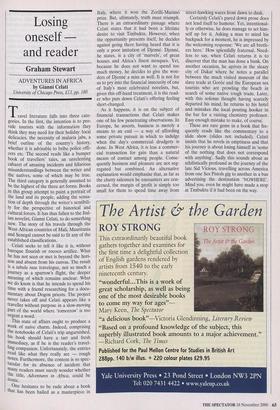Losing oneself and reader
Graham Stewart
ADVENTURES IN AFRICA by Gianni Celati
University of Chicago Press, £13, pp. 180 Travel literature falls into three cate- gories. In the first, the intention is to pro- vide tourists with the information they think they may need for their holiday: local delicacies, the necessity of malaria jabs, a brief outline of the country's history, whether it is advisable to bribe police offi- cers etc. The second reads like a bumper book of travellers' tales, an unrelenting cabaret of amusing incidents and hilarious misunderstandings between the writer and the natives, some of which may be true. The third category is generally assumed to be the highest of the three art forms. Books in this group attempt to paint a portrait' of the land and its people, adding the sensa- tion of depth through the writer's sensibili- ty for the perspective of historical and cultural forces. It has thus fallen to the Ital- ian novelist, Gianni Celati, to do something new. The story of his travels through the West African countries of Mali, Mauritania and Senegal cannot be said to fit any of the established classifications.
Celati seeks to tell it like it is, without baroque flourish or rococo artifice. What he has not seen or met is beyond the hori- zon and absent from his canvas. The result is a tabula rasa travelogue, not so much a Journey as a sparrow's flight, the deeper meaning of which remains unclear. What We do know is that he intends to spend his time with a friend researching for a docu- mentary about Dogon priests. The project never takes off and Celati appears like a traveller without purpose in a slow-moving part of the world where 'tomorrow' is too urgent a word.
This state of affairs ought to produce a work of naive charm. Indeed, comprising the notebooks of Celati's trip ungarnished, 11, is book should have a tart and fresh immediacy, as if he is the reader's travel- ling companion. Unfortunately, the entries read like what they really are — rough notes. Furthermore, the content is so spec- tacular for its absence of incident that many readers must surely wonder whether the title, Adventures in Africa, could be ironic.
One hesitates to be rude about a book that has been hailed as a masterpiece in Italy, where it won the Zerilli-Marimo prize. But, ultimately, truth must triumph. There is an extraordinary passage where Celati states that it had been a lifetime desire to visit Timbuktu. However, when the opportunity presents itself, he decides against going there having heard that it is only a poor imitation of Djenne. Djenne, he states, is a city of 'marvels', of great houses and Africa's finest mosques. Yet, because he does not want to spend too much money, he decides to give the won- ders of Djenne a miss as well. It is not for us to pry into the financial insecurity of one of Italy's most celebrated novelists, but, given this off-hand treatment, it is the read- er who puts down Celati's offering feeling short-changed.
As it happens, it is on the subject of financial transactions that Celati makes one of his few penetrating observations. In Europe, he asserts, business is merely a means to an end — a way of affording some private pursuit in which to indulge when the day's commercial drudgery is done. In West Africa, it is less a commer- cial transaction for gain than a natural means of contact among people. Conse- quently business and pleasure are not seg- regated but combined. An alternative explanation would emphasise that, as far as the chatty salesmen he encounters are con- cerned, the margin of profit is simply too small for them to spend time away from street-hawking wares from dawn to dusk.
Certainly Celati's pared down prose does not lend itself to humour. Yet, intentional- ly or otherwise, he does manage to set him- self up for it. Asking a man to mind his backpack for a moment, he is impressed by the welcoming response: 'We are all broth- ers here.' How splendidly fraternal. Need- less to say, when Celati returns it is to discover that the man has done a bunk. On another occasion, he arrives in the sleazy city of Dakar where he notes a parallel between the much visited museum of the slave trade at Goree and the European sex tourists who are prowling the beach in search of some native rough trade. Later, with this solemn thought having scarcely departed his mind, he returns to his hotel and mistakes the local pouting hooker in the bar for a visiting chemistry professor. Easy enough mistake to make, of course.
These are rare gems in a book that fre- quently reads like the commentary to a slide show (slides not included). Celati insists that he revels in emptiness and that his journey is about losing himself in 'some of the nothing that does not correspond with anything'. Sadly this sounds about as nihilistically profound as the journey of the late Sid Vicious, travelling across America from one Sex Pistols gig to another in a bus advertising the destination 'NOWHERE'. Mind you, even he might have made a stop at Timbuktu if it had been on the way.


































































































 Previous page
Previous page